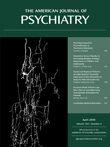To the Editor: In their study published in the October 2007 issue of the
Journal, Matthew C. Keller, Ph.D., et al. examined adverse life events and individual symptoms of depression. However, it appeared that “atypical” symptoms, such as overeating and hypersomnia, were disproportionately associated with no particular adverse events
(1) . This contrasts a significant body of research suggesting that atypical symptoms are highly reactive to external conditions and triggers. Two key examples are overeating and hypersomnia in the context of either seasonal affective disorder driven by environmental light conditions
(2) or Columbia group atypical depression, in which the trigger is usually an otherwise minor interpersonal event
(3) .
Given that atypical episodes are characteristically driven by the physical or social environment, it is a thought-provoking speculation as to why a large proportion of subjects reported no cause for their atypical symptoms in the study conducted by Dr. Keller et al. One major issue that was not discussed by the authors is that seasonality and decreased light availability were not considered in the overall study design. Seasonality and decreased light availability are particularly pertinent to overeating and oversleeping in the context of seasonal affective disorder and its milder variants, which occur in a majority of individuals at the same geographic latitude as Virginia
(4) . The authors might wish to consider separate analysis of data limited to the Spring/Summer versus Fall/Winter periods to assess these important seasonal effects.
A second factor to consider is that on average, atypical symptoms and their environmental triggers may be less salient to individuals compared with melancholic symptoms and their associated triggers. For example, in the case of weight loss and anhedonia secondary to a major loss, both the symptoms and life event stand out as markedly different compared with normal experience as a result of their severity, ego-dystonic nature, and relatively clear, delineated time course. In contrast, in the case of overeating episodes or fatigue triggered by minor interpersonal slights, for example, neither the symptom nor its external trigger will consistently stand out as markedly different compared with normal experience. Over time, the signal-to-noise ratio for atypical symptoms and associated triggers would thus be very low relative to melancholic symptoms. The end result would be an underestimation of the importance of external events in the causation of atypical relative to melancholic symptoms.
Thus, while the overall conclusion that different adverse life events are associated with distinct depressive symptoms is strongly supported in the article by Dr. Keller et al., the specific finding that atypical symptoms are often associated with no adverse life events does not reflect the actual importance of environmental factors in triggering this symptom cluster. The conclusion implied by the data as currently presented—i.e., that melancholic symptoms are more influenced by external circumstances than atypical symptoms—may ultimately reflect more of a measurement and reporting issue than actual clinical reality.

